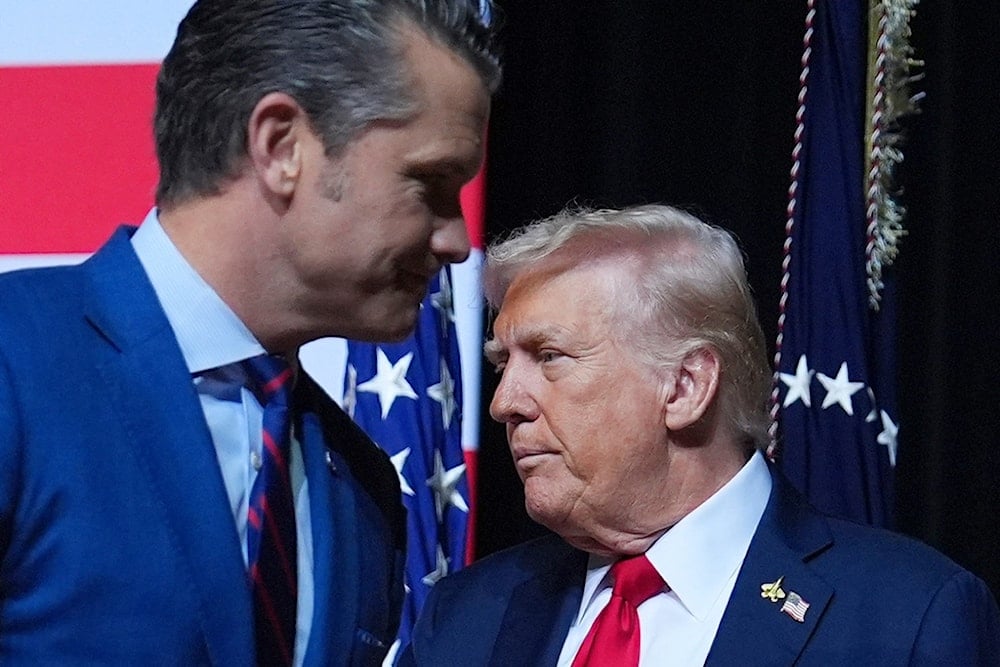UN experts: Trump’s Gaza plan breaches international law
UN experts warn Trump’s Gaza plan violates international law, ignoring ICJ rulings and Palestinian rights to self-determination and justice.
-

President Donald Trump is greeted by War Secretary Pete Hegseth before speaking to a gathering of top US military commanders at Marine Corps Base Quantico, Tuesday, September 30, 2025, in Quantico, Virginia (AP)
UN experts have warned that the main elements of the Gaza peace plan unveiled by US President Donald Trump are fundamentally inconsistent with international law and the 2024 advisory opinion of the International Court of Justice (ICJ), which demanded that "Israel" end its unlawful presence in the occupied Palestinian territories.
In a statement from Geneva, the experts stressed that any peace initiative must fully protect Palestinian human rights and not create new conditions of repression. They cautioned that “imposing peace at any cost, in disregard or defiance of law and justice, is a recipe for further injustice, violence, and instability.”
While the plan’s declared goals, such as ending the war, a ceasefire, prisoner exchanges, humanitarian aid, halting forced displacement from Gaza, Israeli withdrawal, and preventing annexation, were described as welcome, the experts underlined that these are already basic requirements of international law and should not depend on a one-sided peace initiative.
Critique of Trump’s plan
The experts dismantled several key provisions of Trump’s proposal, highlighting major shortcomings:
- Right to self-determination: Palestinians’ right to establish an independent state is not guaranteed, instead tied to vague preconditions linked to Gaza’s redevelopment, Palestinian Authority reforms, and conditional “dialogue” with the Israeli regime.
- Interim government: The suggested “temporary transitional government” excludes Palestinian representation and undermines self-determination, while granting oversight to a “Peace Council” headed by the US president, which was likened to colonial practices.
- International force: A proposed foreign stabilization force, outside UN or Palestinian control, would replace one occupation with another, potentially allowing indefinite Israeli military presence under the guise of a “security perimeter” in Gaza.
- Disarmament: Permanent disarmament of Gaza, with no parallel obligations on the Israeli regime, would leave Palestinians vulnerable to further aggression.
- Bias and accountability: The plan fails to address Israeli settler expansion, war crimes, or compensation for destruction in Gaza, and ignores calls for transitional justice, accountability, and truth-telling.
Plan to lead to unlawful exploitation of Palestinians
The statement also criticized the plan’s economic components, warning they could lead to unlawful exploitation of Palestinian resources without consent, while offering only partial release of Palestinian prisoners compared to unconditional amnesty for Israelis.
UN experts underscored that peace must be grounded in international law, not unilateral dictates. They recalled that the ICJ clearly stated Palestinians’ right to self-determination cannot be conditional, and that the Israeli occupation of Palestinian territories must end fully and unconditionally, with reparations owed to the Palestinian people.
“The United Nations—not Israel or its closest ally—has been identified by the International Court of Justice as the legitimate authority to oversee the end of occupation and the transition toward a political solution that fulfills Palestinian self-determination,” the experts concluded.

 3 Min Read
3 Min Read









